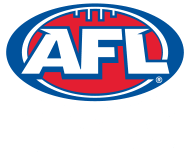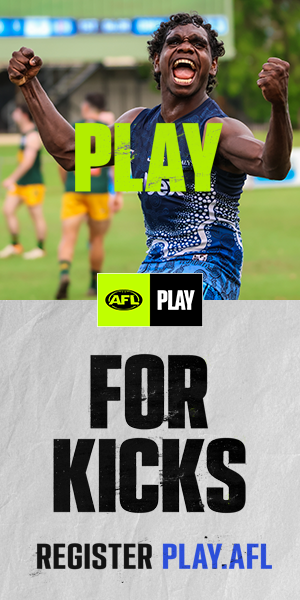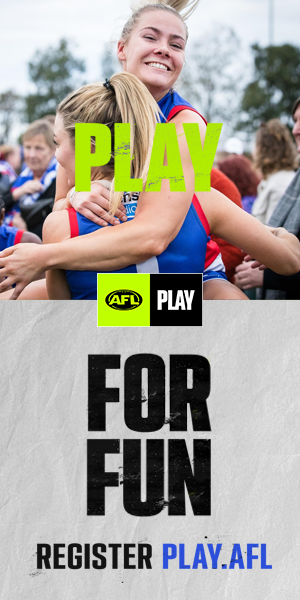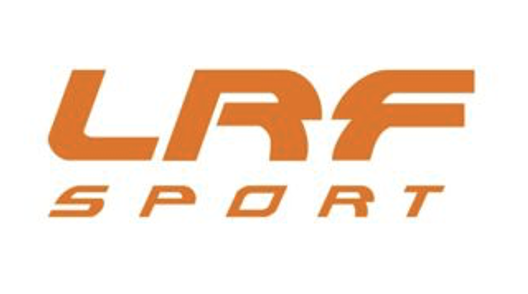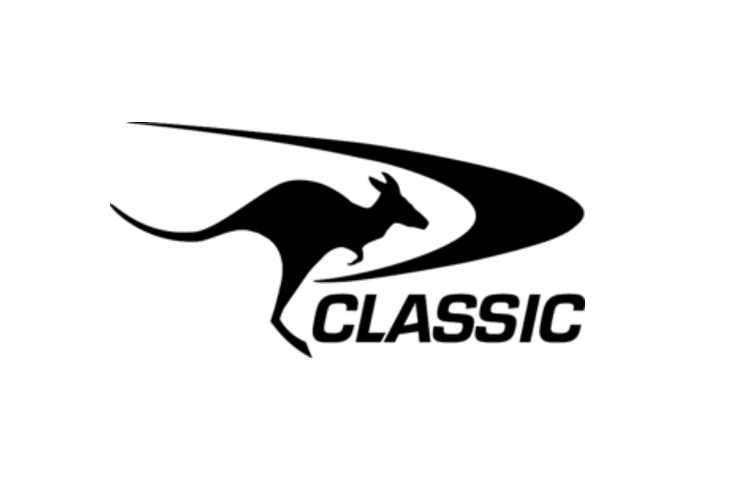The Holman Medal is awarded each year to the best and fairest player in the Darling Downs Football League and with very good reason. Without the Holman family the competition, and particularly the Goondiwindi Hawks, wouldn’t be anything like what they are today.
It’s a football fairytale that began in the tiny town of Lock on South Australia’s Eyre Peninsula, where Phil and Mary Holman ran a mixed farming enterprise and had seven children – brothers Mark, Peter and David, and sisters Robyn, Trenna, Allison and Donna. Phil was a huge football man, president of the Lock Football Club and later the Great Flinders Football League. It rubbed off on the boys, who all played for the Lock Roos before moving to Adelaide to go to school and university.
Mark, the oldest and smallest of the three, was a classy midfielder. He played four years at Port Adelaide in the SANFL and was Reserves captain in his last two years. Peter, a bigger-bodied midfielder, played two years at Port, one year with Amateur club Kilburn, where he won Team of the Year’ honours in 1981 and was equal leading vote-getter in the competition best and fairest medal when ineligible, and had year with North Adelaide in the SANFL.
David, a taller key forward, was on the move much earlier, having joined the army. Originally based at Wodonga, he played Under-18s with the Wodonga Bulldogs in the Ovens & Murray League in 1984 and Cudgewa in the Upper Murray League in 1985 before two seasons with Osborne Park in the Sunday Football League in Perth in 1986-87. After a year off in Sydney he played with Turvey Park in Wagga in 1989.
The Holman boys had farming in their blood too. In 1980 Phil, Mary and Mark Holman began a family transition north when they bought farming land at North Star, a tiny town just east of Moree and 45km south of Goondiwindi, home to about 6,000 people and located on the Queensland/NSW border. They had cattle, wheat, barley, and summer crops. Technically it was NSW, but in a football sense it was Queensland.
The Goondiwindi Hawks, originally part of a Moree-based NSW competition, joined the Darling Downs competition in 1980, wearing green and gold and based at Riddles Oval. Suddenly the Holman family loyalty was split between farming and football. Again.
Mark and Peter, who followed soon after, quickly became stars with the Hawks and the Darling Downs representative side, playing together for eight years. From 1980 to 2000 they were involved as players and/or coaches in 16 grand finals between them, winning seven flags in 1980-83-91-95-96-99-2000. Mark was playing coach from 1993-99, winning the premiership in 1995-96 and 1999, before a serious hip injured forced his premature retirement after about 150 games.
The 1983 flag, when they beat South Toowoomba by 64 points in the grand final, was extra special. Mark was playing coach of a side that included Peter and David, who was visiting the family farm on holidays from school at Immanuel College in Adelaide. It was payback for an incident in the 1982 grand final against the same opposition when Mark was felled behind play in the second quarter and took no further part.
The brothers regularly represented the Darling Downs in the South Queensland Country Championships through the 1980s and completed an extraordinary quadrella when Mark won the carnival medal in 1982-85 either side of Peter doing likewise in 1983-84. Mark won the Holman Medal in 1982 and Peter likewise in 1987-88. They both played for the Downs in a memorable win 20-20 (140) to 16-14 (110) over QAFL club Wilston-Grange at the Toowoomba Showgrounds in 1984.
Peter played ‘about 275’ games in total from 1983-2001, won five premierships and won the Holman Medal in 1987-88. He also coached the Downs representative side to their first championship in 1984, and in 1989 was vice captain of the inaugural Queensland Country team that played Victorian Country at Carrara in the curtain-raiser to a Brisbane Bears AFL game. In 1989 in the twilight of his career Peter was selected in the first Queensland Country team that played Victorian Country at Carrara. He also coached the Goondiwindi Under-12 team in 2000-01, winning a premiership in his second season where his four boys began their football journey.
David had finally been reunited with his brothers when he moved to Toowoomba in 1990. He played with Goondiwindi in 1990-91-92, coached Coolaroo from 1993-96 before a mid-season work transfer to Perth. Nursing a foot injury suffered in the 1995 representative game on the Gold Coast, he didn’t play in his second stint in the WA capital, but after a shift to Mt. Isa in 1998, he played with the Mt. Isa Tigers from 1998-2002, coached the Mt. Isa representative side against Tenant Creek and Townsville, and was involved with the Auskick program when his first son Ben started to play.
Still one of the best Holman stories was David’s last game for Goondiwindi in 1992. With the League presentation night to follow immediately afterwards, he went into the last round eight goals behind the League’s leading goal-kicker, who himself kicked eight to move 16 clear. So David, playing for Goondiwindi Hawks against the Toowoomba Tigers, helped himself to a lazy 20.
The Holman on-field influence was big, but their off-field influence was even bigger. With local teacher Tony Doherty, who had a vast 15-year involvement with junior programs at school and club level, they ran an Auskick program from 1984-88. Starting with 20 boys and girls on a Friday afternoon it quickly grew into the largest Auskick centre outside of Brisbane.
Just as significantly, Mark Holman was a driving force on a committee that sourced council money to plan and build new club rooms which remain the Hawks’ home today. Not to be outdone, father Phil, well into his 70s, came out of retirement to take over the presidency of the local League in 1998 when its viability was in question.
It was a job that took the patriarch of the Holman family all the way back to his roots when his own football journey began in 1941 playing with Kyancutta and later Lock on the Eyre Peninsula in South Australia. A considered man, with the ability to see the bigger picture and unite people for the common good, he also called on the experience of four years as president of the Great Flinders League in SA before the family moved to Queensland.
With the help of incoming DDAFL development officer Jack Barry, later to fill a variety of key roles at AFL Queensland and with AFLQ club Morningside, he stabilised the competition in 1999. Almost prophetically, Goondiwindi, coached by Mark Holman, beat Toowoomba by 84 points in the 1999 grand final.
By 2002 the competition had stabilised, and Phil Holman stepped down. As noted in ‘More of the Kangaroo – 150 Years of Australian Football in Queensland’, an extensive history of the game from 1986-2016, he had led the League from the brink of extinction. It was during his time at the helm that the League was re-branded AFL Darling Downs, and fittingly he was later rewarded with Life Membership. Phil Holman lived to enjoy it all until 8 June 2018, while Mary, the heart and soul of the family, died on 31 December 2022.
Mark, the designated family spokesman, is rightfully proud of the Holman’s 20-year involvement with Australian football in an area that had for so long been dominated by rugby league and rugby union. “We started playing with the club, trying to juggle farm life with the tremendous travel involved. We’d do a round trip of six hours to play a game and because a lot of farmers were involved, you wouldn’t really know who was playing until you arrived,” he reflected.
“It was a fantastic time. A lot of people from South Australia and Victoria had moved north. They were third and fourth generation football people so it ran deep. We tried to set the club up like it was done back in South Australia. The standard of the competition was good, and it didn’t hurt that footy was often on the back page of the ‘Argus’.”
“We were all about the same age and were good mates who were lucky enough to land in such a good spot. We were united by football, we got married and had families together, and we still get back and catch up regularly.”
A qualified teacher, Mark joined the staff at St. Peter’s College after his family moved to Brisbane in 2002. In 2008-09 he shared coaching duties with Lions ace Chris Johnson as the school won back-to-back premierships in the Open AIC (Associated Independent Colleges) competition and was assistant coach to John Blair at Morningside from 2008-11, when they played in four consecutive grand finals and won two premierships. He is now Coaching Coordinator at St. Peter’s College, working across 30 sports at a school where his American-born wife Kim oversees the boarding house. Mark and Kim are parents to Ryan, Chelsea and Natalie and have four grandchildren. Ryan played 10 years at Morningside and was a Queensland representative.
Peter lives in Albury, where in earlier days, he was an Under-18 coach with the Lavington Panthers and junior president for two years before taking on an Under-18 coaching role with North Albury. His sons Nicholas, Kristopher and twins Thomas and Luke all played in the O&M League. All are married and have delivered eight grandchildren to keep the family tradition going. Peter has re-trained and is now a teacher content just to watch local football, while Donna, who was responsible for the design of the Holman Medal before it was stamped as a medallion, is a pre-school educator.
David, who has lived in Perth with wife Tracy since 2003, is the chief operating officer with RCT, a world-acclaimed developer of mining automation technology. Between 2003 and 2012 he was involved in coaching junior teams at local level, was assistant coach at Guildford Grammer for two years and part of the coaching team at Swan Districts WAFL development teams over three years. Tracy was close by as team manager. They, too, have done their bit for the family legacy, with son Ben and daughter Ashleigh, and one grandchild. Ben played eight years at Swans and made his senior debut in 2017.
It’s a truly amazing family football story that has been pivotal to the game on the Darling Downs, among other places. Regardless of how much the family grows and what happens in the future there will always be another ‘brother’ or ‘sister’ looking to carry on the family name.
